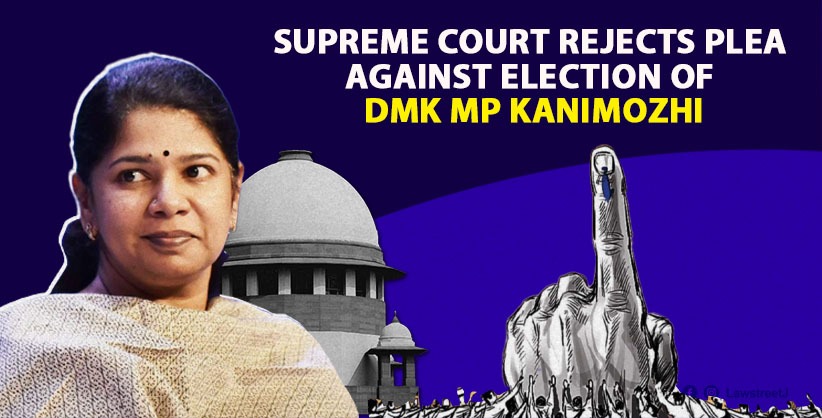NEW DELHI: In a relief to DMK leader Kanimozhi, the Supreme Court on Thursday dismissed a plea filed against her election as an MP from Thoothukudi constituency in 2019 for allegedly concealing PAN card details of her NRI husband.
A bench of Justices Ajay Rastogi and Bela M Trivedi pointed the appellant, Kanimozhi had clearly stated in Form 26 that there was no PAN card number of spouse K Aravindhan in view of his foreign citizenship.
"Mere bald and vague allegations without any basis would not be sufficient compliance of the requirement of stating material facts in the election petition. As well settled not only positive statement of facts, even a positive statement of negative fact is also required to be stated, as it would be a material fact constituting a cause of action," the bench said.
The court noted A Santhana Kumar and others who filed the election petition failed to disclose material facts.
"The material facts which are primary and basic facts have to be pleaded by the election petitioner in support of the case set up by him to show his cause of action and omission of a single material fact would lead to an incomplete cause of action, entitling the returned candidate to pray for dismissal of Election petition under Order VII Rule 11(a) CPC read with Section 83(1)(a) of the RP Act," the bench pointed out.
The bench said it was obligatory on the part of the election petitioner to state as to what was the Permanent Account Number of the spouse of the returned candidate in India which was suppressed by her and how the other details furnished about her husband in the said Form No. 26 were incomplete or false.
Enunciating the legal position on the subject, the bench said, "The Election petition is a serious matter and it cannot be treated lightly or in a fanciful manner nor is it given to a person who uses it as a handle for vexatious purpose."
"An election petition can be summarily dismissed on the omission of a single material fact leading to an incomplete cause of action, or omission to contain a concise statement of material facts on which the petitioner relies for establishing a cause of action, in exercise of the powers under Clause (a) of Rule 11 of Order VII CPC read with the mandatory requirements enjoined by Section 83 of the Representation of People Act," the bench added.
The court pointed out so far as present petition is concerned, there is no averment made as to how there was non-compliance with provisions of the Constitution or of RP Act or of the Rules or Order made thereunder and as to how such non-compliance had materially affected the result of the election, so as to attract the ground under Section 100(1)(d)(iv) of the RP Act, for declaring the election to be void.
"The omission to state such vital and basic facts has rendered the petition liable to be dismissed under Order VII, Rule 11(a) CPC read with Section 83(i)(a) of the RP Act, 1951," it added.
Relying upon previous judgements, the top court said, a right to elect, though fundamental it is to democracy, is neither a fundamental right nor a common law right. It is purely a statutory right.
"Similarly, right to be elected and the right to dispute an election are also statutory rights. Since they are statutory creations, they are subject to statutory limitations. An Election petition is not an action at common law, nor in equity. It is a special jurisdiction to be exercised in accordance with the statute creating it. The concept familiar to common law and equity must remain strangers to election law unless statutorily embodied. Thus, the entire election process commencing from the issuance from the notification calling upon a constituency to elect a member or members right upto the final resolution of the dispute, concerning the election is regulated by the Representation of People Act 1951. The said RP Act therefore has been held to be a complete and self-contained code within which must be found any rights claimed in relation to an election dispute," it said.







